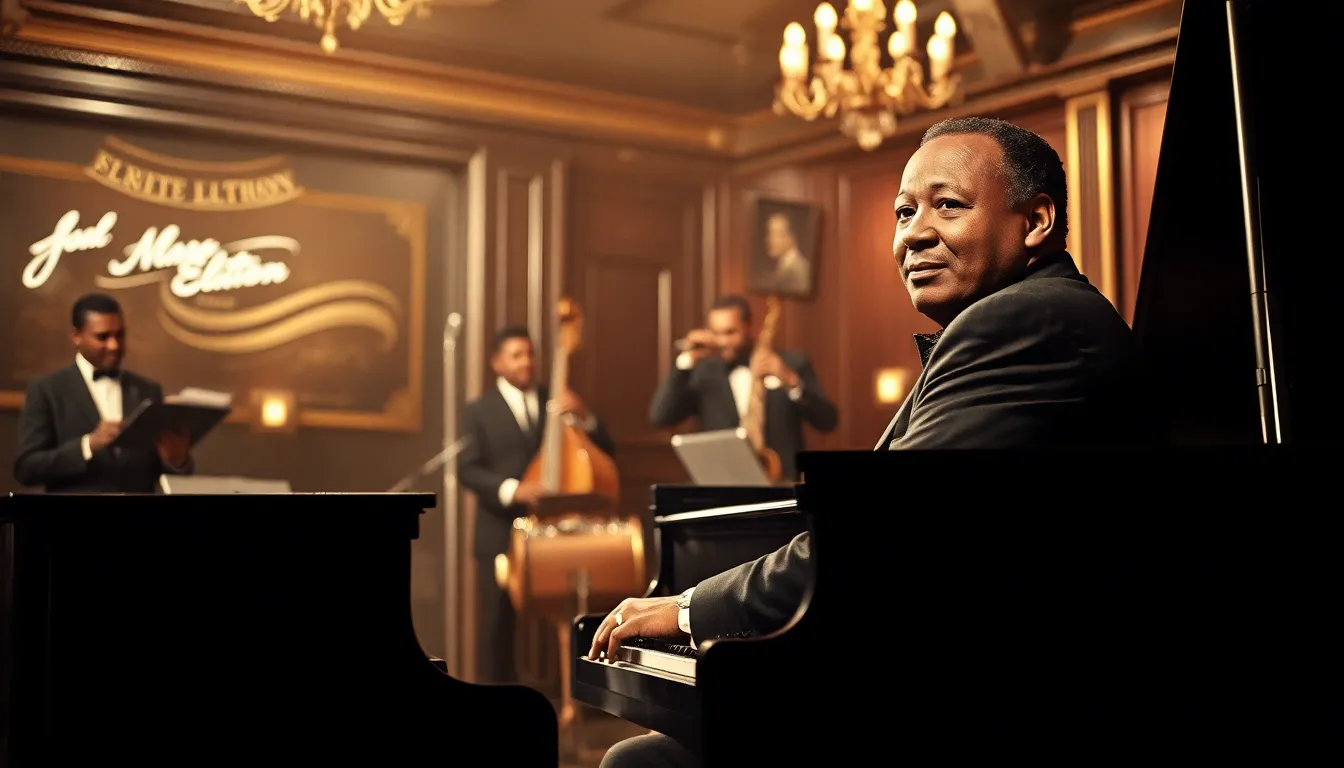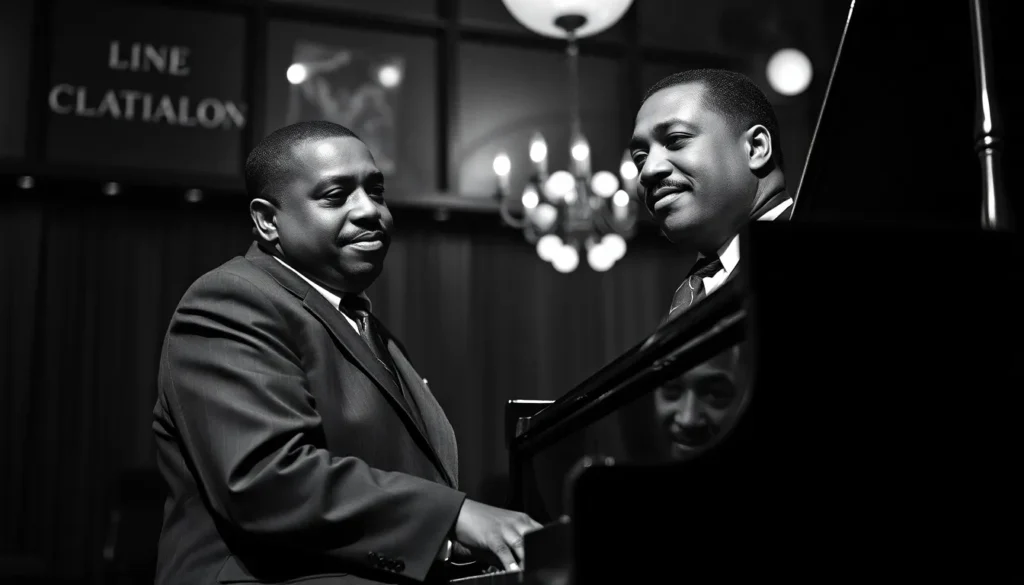Table of Contents
ToggleDuke Ellington wasn’t just a musician; he was a musical magician who transformed jazz into an art form that dazzled audiences worldwide. With his signature style and unmatched talent, he turned the piano into a storytelling device, weaving intricate melodies that made listeners tap their feet and sway in their seats. If jazz had a royal family, he’d be the king, wearing a crown made of saxophones and trumpets.
But Ellington’s legacy goes beyond his catchy tunes and smooth grooves. He was a trailblazer who broke barriers and reshaped the music scene, proving that jazz could be sophisticated and accessible. From the Cotton Club to concert halls, he brought people together, showing that music truly knows no bounds. Dive into the world of Duke Ellington and discover what made him a legendary figure in the realm of jazz.
Early Life and Background
Duke Ellington’s early life contributed significantly to his musical legacy. Born on April 29, 1899, in Washington, D.C., he grew up in a creative environment where music thrived.
Family and Upbringing
His mother, Daisy, aspired to be a pianist, providing him with early exposure to music. Edward, his father, was a butler who also played the piano. These influences fostered a deep appreciation for music. Ellington’s family encouraged his artistic interests, allowing him to explore different genres. This supportive background played a vital role in shaping his unique musical identity.
Musical Influences
Ellington’s music was greatly shaped by the rich cultural milieu of Washington, D.C. The sounds of ragtime and blues permeated his surroundings, inspiring his compositions. Notable musicians like James P. Johnson and Willie “The Lion” Smith influenced his early piano style. Jazz performances in local venues sparked his creativity. Exposure to classical music broadened his understanding of intricate arrangements. These diverse musical influences laid the foundation for his innovative approach to jazz.
Musical Career Highlights

Duke Ellington’s musical career showcases his exceptional talent and wide-ranging impact on jazz. His innovative styles and compositions set new standards in the genre.
Rise to Fame
Ellington’s rise to fame started in the 1920s, thanks in part to his ensemble, the Washingtonians. The band gained traction at the Cotton Club in Harlem, drawing large crowds and critical acclaim. His unique orchestration and arrangements attracted attention, blending jazz with classical elements. Major performances like the 1927 show “Black and Tan Fantasy” highlighted his creative genius. Audiences embraced his music for its sophistication and originality, helping Ellington achieve national recognition.
Signature Works
Ellington produced many signature works that remain influential today. “Mood Indigo” epitomizes his innovative approach, featuring lush harmonies and intricate melodies. Another masterpiece, “Take the ‘A’ Train,” reflects his ability to capture the essence of jazz in vibrant, catchy tunes. “It Don’t Mean a Thing (If It Ain’t Got That Swing)” reinforces his association with swing music, showcasing his distinctive rhythm. These compositions not only solidified his status but also inspired countless musicians across generations.
Contributions to Jazz and Music
Duke Ellington significantly shaped jazz and music through his innovative contributions and collaborations.
Innovative Techniques
Ellington transformed jazz by developing unique compositional techniques. His use of orchestration redefined the sound of big bands, incorporating diverse instruments such as the saxophone and trumpet. Ellington often utilized call-and-response patterns and complex harmonies, which added richness to his arrangements. The incorporation of spoken word and vocals further showcased his versatility. A notable example includes the piece “Black, Brown and Beige,” which blended narrative elements with musical themes, reflecting African American culture. By pushing the boundaries of jazz, he elevated it into an art form, influencing generations of musicians.
Collaborations with Other Artists
Ellington frequently collaborated with talented musicians, enhancing his works with innovative ideas. His partnerships with artists like Johnny Hodges and Cootie Williams produced memorable recordings that showcased their unique styles. Ellington also worked with the likes of Ella Fitzgerald and at times, even jazz legends like Louis Armstrong. These collaborations resulted in masterpieces that resonated with audiences. “Mood Indigo” and “It Don’t Mean a Thing (If It Ain’t Got That Swing)” exemplify the magic of these partnerships, merging various influences to create memorable music. Through these collaborations, Ellington not only solidified his place in jazz history but also fostered a spirit of creativity and unity.
Legacy and Influence
Duke Ellington’s legacy endures through his profound impact on jazz and music as a whole. He inspired countless musicians and composers across various genres, setting a standard for artistic expression.
Impact on Future Generations
Ellington’s innovative techniques shaped the development of jazz, influencing artists like Miles Davis and John Coltrane. These musicians expanded on his concepts and pushed boundaries in their own work. His distinctive blend of orchestration and improvisation encouraged future generations to experiment with their sound. As a mentor, he nurtured young talent, leading to the rise of new artists. The respect awarded to him reflects his lasting influence, as his compositions remain relevant in modern jazz education.
Cultural Significance
Ellington not only transformed jazz but connected it deeply with African American culture. His works often explored themes of identity and social issues, making them resonate with audiences. Performances like “Black, Brown and Beige” offered a narrative of the African American experience. These contributions helped elevate jazz beyond entertainment, as it became a medium for cultural storytelling. Ellington’s music remains a source of pride and inspiration, fostering a sense of unity and recognition within the broader cultural landscape.
Duke Ellington’s influence on jazz and music is undeniable. His innovative techniques and unique compositions transformed the genre, making it a respected art form. Through his storytelling ability and rich arrangements, he connected deeply with audiences, creating a sense of unity and cultural pride.
Ellington’s legacy continues to inspire musicians today, encouraging them to explore new sounds and push artistic boundaries. His work not only celebrates African American culture but also serves as a reminder of the power of music to convey profound narratives. As a pioneer in the jazz world, Ellington’s contributions will forever resonate, ensuring his place in music history remains secure.







